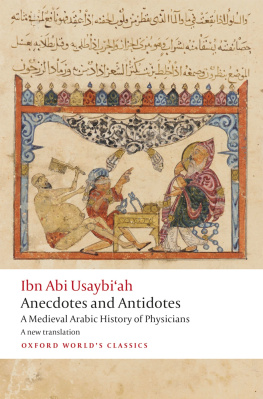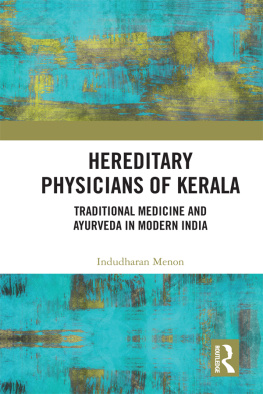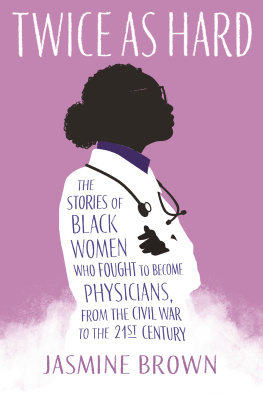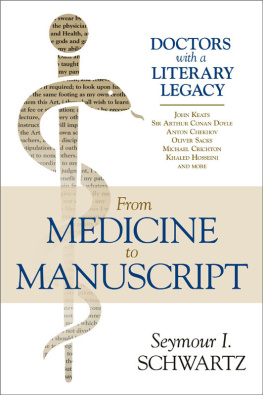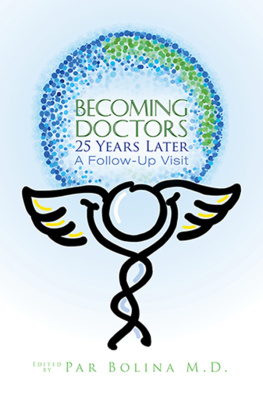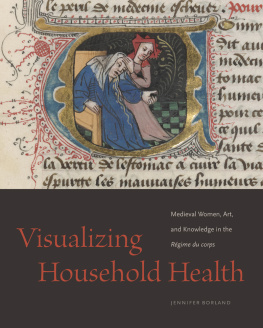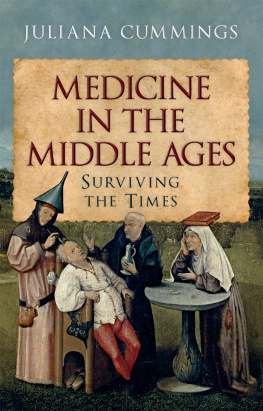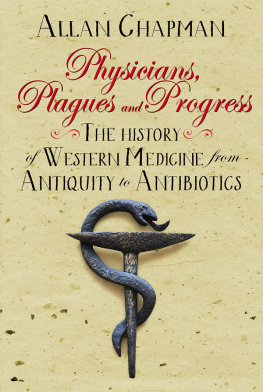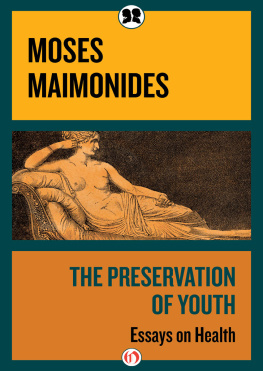oxford worlds classics
ANECDOTES AND ANTIDOTES
an abridged translation of
THE BEST ACCOUNTS OF THE CLASSES OF PHYSICIANS
Ibn Abi Usaybiah was born at Damascus. The son of a physician, he studied medicine at Damascus and in 1234 he was appointed physician to a new hospital in Cairo. His only surviving work is The Best Accounts of the Classes of Physicians, which covers 1,850 years of medical practice, from the mythological beginnings of medicine with Asclepius through Greece, Rome, and India, down to the authors day. Written as much to entertain as to inform, it is not only the earliest comprehensive history of medicine but the most important and ambitious of the medieval period, incorporating accounts of over 432 physicians, their training, practice, and medical compositions, all interlaced with amusing poetry and anecdotes illustrating their life and character. The Herodotean breadth of the book reflects the geographical and cultural reach of the Islamic empire. Written by a man who was a medic and a poet, this highly readable history reflects considerable medical experience and lies at the interface of the serious medical practice of the day with societys interest in biography and gossip. He died in 1270, having created a book that is one of the most delightful productions of Classical Arabic.
Henrietta Sharp Cockrell worked as a specialist for Christies Islamic Dept in London for several years. Now freelance, her consultancy work has included contributing to the Nasser D. Khalili catalogue, Gems and Jewels of Mughal India, and assisting on the New Catalogue of Arabic Manuscripts at the Bodleian Library, where she devised the Sharp Scale for quantifying paper translucency. She also worked in Kuwait for UNESCO after the Iraqi invasion and is an occasional writer for The Art Newspaper.
Contributors :Geert Jan van Gelder, fba, was Laudian Professor of Arabic, University of Oxford; Emilie Savage-Smith, fba, was Professor of the History of Islamic Science, University of Oxford; Simon Swain, fba, is Professor of Classics, University of Warwick; Ignacio Snchez is a Senior Research Fellow, Department of Classics & Ancient History, University of Warwick; N. Peter Joosse was Senior Research Fellow at Leiden University and Department of Classics & Ancient History, University of Warwick; Alasdair Watson is Bahari Curator of Persian Collections, Bodleian Library, University of Oxford; Bruce Inksetter was for many years an Arabic translator with unesco; and Franak Hilloowala wrote her doctoral thesis on Ibn Ab Usaybiah. Credit for the maps goes to Daniel Burt.
oxford worlds classics
For over 100 years Oxford Worlds Classics have brought readers closer to the worlds great literature. Now with over 700 titlesfrom the 4,000-year-old myths of Mesopotamia to the twentieth centurys greatest novelsthe series makes available lesser-known as well as celebrated writing.
The pocket-sized hardbacks of the early years contained introductions by Virginia Woolf, T. S. Eliot, Graham Greene, and other literary figures which enriched the experience of reading. Today the series is recognized for its fine scholarship and reliability in texts that span world literature, drama and poetry, religion, philosophy, and politics. Each edition includes perceptive commentary and essential background information to meet the changing needs of readers.

Great Clarendon Street, Oxford, ox2 6dp , United Kingdom
Oxford University Press is a department of the University of Oxford. It furthers the Universitys objective of excellence in research, scholarship, and education by publishing worldwide. Oxford is a registered trade mark of Oxford University Press in the UK and in certain other countries
Translation Emilie Savage-Smith, Simon Swain, and Geert Jan van Gelder, with Ignacio Snchez, N. Peter Joosse, Alasdair Watson, Bruce Inksetter, and Franak Hilloowala 2020 Explanatory notes Henrietta Sharp Cockrell Introduction Geert Jan van Gelder
The moral rights of the authors have been asserted
First published as an Oxford Worlds Classics paperback 2020
Impression: 1
All rights reserved. No part of this publication may be reproduced, stored in a retrieval system, or transmitted, in any form or by any means, without the prior permission in writing of Oxford University Press, or as expressly permitted by law, by licence or under terms agreed with the appropriate reprographics rights organization. Enquiries concerning reproduction outside the scope of the above should be sent to the Rights Department, Oxford University Press, at the address above
You must not circulate this work in any other form and you must impose this same condition on any acquirer
Published in the United States of America by Oxford University Press
198 Madison Avenue, New York, NY 10016, United States of America
British Library Cataloguing in Publication Data
Data available
Library of Congress Control Number: 2020933194
ISBN 9780198827924
ebook ISBN 9780192562944
Printed and bound in Great Britain by Clays Ltd, Elcograf S.p.A.
Links to third party websites are provided by Oxford in good faith and for information only. Oxford disclaims any responsibility for the materials contained in any third party website referenced in this work.
CONTENTS
This introduction discusses the extraordinary biographical world history of medics and medical cultureindeed, the first world history of medicine ever attemptedfrom which the present volumes selected passages are taken. This extraordinary work was written by a Syrian physician called Ibn Ab Usaybiah, who died in 1270, having created a book that is one of the most delightful productions of Classical Arabic.
Ibn Ab Usaybiah was a Muslim, a practising physician, and a man with a brilliant gift for describing fellow-doctors and the societies they served without prejudice to their religion or background. His book is somewhat Herodotean in scope: a highly readable account of over 430 physicians, featuring their lives and training as well as their medical and other works, including four autobiographies to which he had access.
The rhyming Arabic title of his book, Uyn al-anb f tabaqt al-atibb, translates as The best accounts: on the classes of physiciansa very Arabic formulation. The classes in question are the different groups and categorieschronological, geographical, ethnic, religious who were encountered by Ibn Ab Usaybiah in his tour through some 1,850 years of medics, patients, and patrons, from ancient Greece and Rome to India and the lands in between. The whole is interlaced with amusing poems and tales illustrating the characters and achievements of the authors subjects, embellished with witty aphorisms and plentiful quotations from their writings.
This is a world where science was shared between Muslims, Jews, and Christians and where physicians had their surgeries and hospitals as they do today. Our authors grandfather, father, and uncle were all well-known physicians of their generations and served in the courts of various sultans and princes, including the famous ruler Salh al-Dn (Saladin). Ibn Ab Usaybiah himself trained in ophthalmology at the renowned Nsir hospital founded in Cairo by Saladin in 1171. Indeed, his remarkable history of medicine contains our most important accounts of medical activity administered in medieval hospitals.

